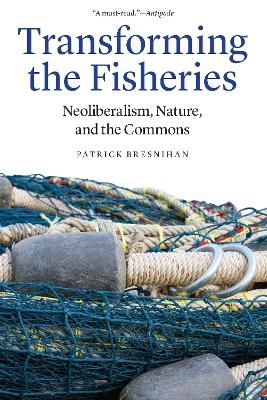
Transforming the Fisheries
Neoliberalism, Nature, and the Commons
Seiten
2018
University of Nebraska Press (Verlag)
978-1-4962-0640-4 (ISBN)
University of Nebraska Press (Verlag)
978-1-4962-0640-4 (ISBN)
Examines how scientific, economic, and regulatory responses to the problem of overfishing have changed over the past twenty years. Based on fieldwork in a commercial fishing port in Ireland, Patrick Bresnihan’s book examines how efforts to address the problem of overfishing are transforming how the marine environment is valued and governed.
There is now widespread agreement that fish stocks are severely depleted and fishing activity must be limited. At the same time, the promise of the green economy appears to offer profitable new opportunities for a sustainable seafood industry. What do these seemingly contradictory ideas of natural limits and green growth mean in practice? What do they tell us more generally about current transformations to the way nature is valued and managed? And who suffers and who benefits from these new ecological arrangements? Far from abstract policy considerations, Patrick Bresnihan shows how new approaches to environmental management are transforming the fisheries and generating novel forms of exclusion in the process.
Transforming the Fisheries examines how scientific, economic, and regulatory responses to the problem of overfishing have changed over the past twenty years. Based on fieldwork in a commercial fishing port in Ireland, Bresnihan weaves together ethnography, science, history, and social theory to explore the changing relationships between knowledge, nature, and the market. For Bresnihan, many of the key concepts that govern contemporary environmental thinking—such as scarcity, sustainability, the commons, and enclosure—should be reconsidered in light of the collapse of global fish stocks and the different ways this problem is being addressed. Only by considering these concepts anew can we begin to reinvent the ecological commons we need for the future.
There is now widespread agreement that fish stocks are severely depleted and fishing activity must be limited. At the same time, the promise of the green economy appears to offer profitable new opportunities for a sustainable seafood industry. What do these seemingly contradictory ideas of natural limits and green growth mean in practice? What do they tell us more generally about current transformations to the way nature is valued and managed? And who suffers and who benefits from these new ecological arrangements? Far from abstract policy considerations, Patrick Bresnihan shows how new approaches to environmental management are transforming the fisheries and generating novel forms of exclusion in the process.
Transforming the Fisheries examines how scientific, economic, and regulatory responses to the problem of overfishing have changed over the past twenty years. Based on fieldwork in a commercial fishing port in Ireland, Bresnihan weaves together ethnography, science, history, and social theory to explore the changing relationships between knowledge, nature, and the market. For Bresnihan, many of the key concepts that govern contemporary environmental thinking—such as scarcity, sustainability, the commons, and enclosure—should be reconsidered in light of the collapse of global fish stocks and the different ways this problem is being addressed. Only by considering these concepts anew can we begin to reinvent the ecological commons we need for the future.
Patrick Bresnihan is an assistant professor in environmental geography at Trinity College, Dublin.
Acknowledgments1. Introduction: Ecological Crises and Beyond2. The End of the Line: Scarcity, Liberalism, and Enclosure3. Stewards of the Sea: Neoliberalism and the Making of the Environmental Entrepreneur4. Community-Managed Resources: A “Third Way” for Environmental Governance5. The More-Than-Human Commons: From Commons to Commoning6. Conclusion: Neoliberalism and the CommonsNotesBibliographyIndex
| Erscheinungsdatum | 13.06.2018 |
|---|---|
| Zusatzinfo | index |
| Verlagsort | Lincoln |
| Sprache | englisch |
| Maße | 152 x 229 mm |
| Themenwelt | Naturwissenschaften ► Biologie ► Ökologie / Naturschutz |
| Wirtschaft ► Allgemeines / Lexika | |
| Wirtschaft ► Volkswirtschaftslehre | |
| Weitere Fachgebiete ► Land- / Forstwirtschaft / Fischerei | |
| ISBN-10 | 1-4962-0640-1 / 1496206401 |
| ISBN-13 | 978-1-4962-0640-4 / 9781496206404 |
| Zustand | Neuware |
| Informationen gemäß Produktsicherheitsverordnung (GPSR) | |
| Haben Sie eine Frage zum Produkt? |
Mehr entdecken
aus dem Bereich
aus dem Bereich
Lehrbuch zu Grundlagen, Technologie und Praxis
Buch | Hardcover (2022)
Hanser (Verlag)
34,99 €


